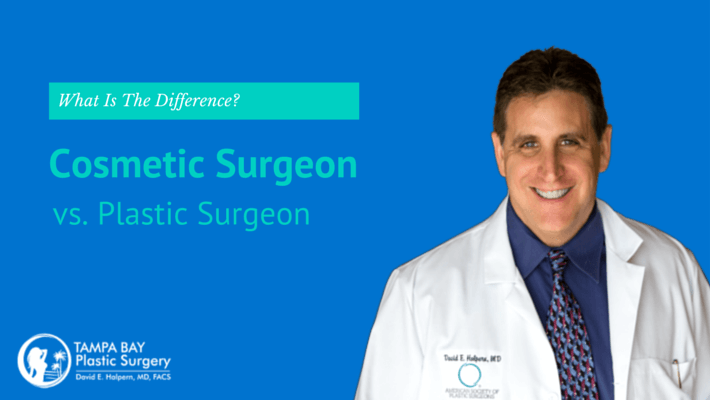What Is The Difference Between A Cosmetic Surgeon And A Plastic Surgeon?

The terms “cosmetic surgeon” and “plastic surgeon” are often misused interchangeably – when, in fact, there are big differences in goals, approach, training, experience and expertise. The confusion is understandable, since there are many plastic surgeons who also perform cosmetic surgery. When looking for a medical professional to perform your plastic surgery or cosmetic procedure, there is no one better suited than a plastic surgeon who is board-certified by the American Board of Plastic Surgery.
Here’s why…
Plastic surgeons understand much more than “how to make people look good”
First, let’s look at the two definitions:
Definition of Cosmetic Surgery: reconstruction of cutaneous or underlying tissues, performed to improve and correct a structural defect or to remove a scar, birthmark, or normal evidence of aging.
Cosmetic surgery is an essential component of the plastic surgery discipline, but plastic surgery goes far beyond the superficial.
Definition of Plastic Surgery: the repair, reconstruction, or replacement of physical defects of form or function involving the skin, musculoskeletal system, cranio-maxillofacial structures, hand, extremities, breast and trunk, and external genitalia or cosmetic enhancement of these areas of the body.
As the American Society of Plastic Surgeons clarifies: “Competency in plastic surgery implies an amalgam of basic medical and surgical knowledge, operative judgment, technical expertise, ethical behavior and interpersonal skills to achieve problem resolution and patient satisfaction.”
Anatomy, physiology, and pathology are all areas of in-depth study for the plastic surgeon. Areas of specialized skill and study for a plastic surgeon include free tissue transfer, fat grafts, replantation, complex wound management, and innovative liposuction techniques.
Cosmetic Surgeons are not recognized by the American Board of Medical Specialties
It is important for patients to understand that there are NO legitimate certifying boards for “cosmetic” surgery. You may have heard of the American Board of Cosmetic Surgery, but this group is NOT recognized by the American Board of Medical Specialties (which represents the gold standard of patient safety and care.) The only recognized certifying body for this field is the American Board of Plastic Surgery.
ANY licensed physician can claim to be a cosmetic surgeon. A “cosmetic surgeon” can be a licensed dermatologist, general surgeon, ophthalmologist, podiatrist, or general practitioner, for instance. The training can range from a handful of short weekend courses on how to perform liposuction or inject Botox, up to a one-year cosmetic surgery fellowship. Some cosmetic surgeons have undergone residency training, but it’s not mandatory to call oneself a “board-certified cosmetic surgeon.” Think about it: would YOU want a dermatologist trained in matters of the skin doing your rhinoplasty or breast implants?
Plastic Surgeons Undergo More Extensive Training
A plastic surgeon has completed medical school, underwent rigorous training serving as a surgical resident for at least three years, and spent another three years in fellowship, learning about specialized aspects of plastic surgery. The entire educational process can take six to eight years for completion. By law, plastic surgeons must have their title displayed in the waiting room, so patients can view their credentials. Re-certification is mandatory every 10 years.
The best-trained plastic surgeons are board-certified by the American Board of Plastic Surgery, which means they have also passed comprehensive oral and written exams, graduated from an accredited medical school, agreed to adhere to a strict code of moral ethics, perform surgery in an accredited, state-licensed, Medicare-certified surgical facility, and complete continuing educational courses (including patient safety) each year.
Board-certified plastic surgeons can also be members of the American Society of Plastic Surgeons or the American Society for Aesthetic Plastic Surgery, which require an additional 150 hours of educational training every three years and the submission of six months of surgical cases for review.
Cosmetic Surgeons vs. Plastic Surgeons: What The Difference Means To Patients
As Dr. Marc Malek so eloquently put it: “Anyone can wear a white coat and call themselves a cosmetic surgeon, but not everyone has the training and expertise to give you the safest possible experience.”
Related: How to Choose a Plastic Surgeon and Patient Safety Resources
The bottom line is this: ONLY the American Board of Plastic Surgery is acknowledged by the American Board of Medical Specialties for providing medical professionals with the highest standard of skills, knowledge, judgment, techniques, safety and ethics to perform aesthetic procedures on patients.
Hospitals ONLY allow medical professionals who are board-certified by the American Board of Plastic Surgery (and deemed competent by hospital administrators) to treat patients in their facilities.
A non-board-certified cosmetic surgeon may learn how to place a breast implant competently, but if unexpected complications arise, you want someone who is more knowledgeable of the total body anatomy and more competent at correcting the issue. The level of post-operative care provided by board-certified plastic surgeons is first-rate. Why settle for less than the very best?
Call (813) 871-5000 or contact the office for more information on cosmetic procedures performed by Tampa’s triple-board-certified plastic surgeon Dr. David Halpern.
Previous Posts
- Lifestyle Lift Closes Its Doors, Highlighting Patient Safety Concerns
- Young Professionals Seeking Earlobe Repair Surgery On the Rise
- How to Choose a Plastic Surgeon and Patient Safety Resources
Please like Dr. David Halpern on Facebook.